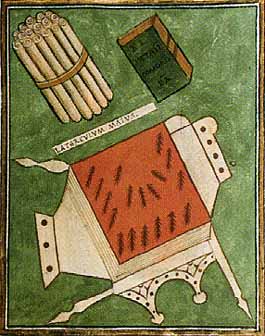primicerius on:
[Wikipedia]
[Google]
[Amazon]
The
 From their origin in the court of the
From their origin in the court of the
Latin
Latin ( or ) is a classical language belonging to the Italic languages, Italic branch of the Indo-European languages. Latin was originally spoken by the Latins (Italic tribe), Latins in Latium (now known as Lazio), the lower Tiber area aroun ...
term ''primicerius'', Hellenized as ''primikērios'' (), was a title applied in the later Roman Empire
In historiography, the Late or Later Roman Empire, traditionally covering the period from 284 CE to 641 CE, was a time of significant transformation in Roman governance, society, and religion. Diocletian's reforms, including the establishment of t ...
and the Byzantine Empire
The Byzantine Empire, also known as the Eastern Roman Empire, was the continuation of the Roman Empire centred on Constantinople during late antiquity and the Middle Ages. Having survived History of the Roman Empire, the events that caused the ...
to the heads of administrative departments, and also used by the Church to denote the heads of various colleges.
Etymologically the term derives from ''primus in cera'', which is to say ''in tabula cerata'', the first name in a list of a class of officials, which was usually inscribed on a waxed tablet.
Civil and military
 From their origin in the court of the
From their origin in the court of the Dominate
The Dominate is a periodisation of the Roman Empire during late antiquity
Late antiquity marks the period that comes after the end of classical antiquity and stretches into the onset of the Early Middle Ages. Late antiquity as a period was p ...
, there were several ''primicerii'' (''primikērioi'' in Greek, from the 12th century usually spelled ''primmikērioi''). In the court, there was the ''primicerius sacri cubiculi'' (in Byzantine times the ''primikērios'' of the ''kouboukleion''), in charge of the emperor's bedchamber, almost always a eunuch. The title was also given to court officials in combination with other offices connected to the imperial person, such as the special treasury (''eidikon The (), also known simply as the , meaning 'Special Secretary', or, from the 11th century on, as the , was an official of the Byzantine Empire who controlled the department known as , a special treasury and Warehouse, storehouse..
History and fun ...
'') or the imperial wardrobe ('' vestiarion''). Other ''primicerii'' headed some of the ''scrinia'' (departments) of the palace, chiefly the '' notarii'' or ''primicerius notariorum'' (''notarioi'' or ''taboularioi'' in Byzantine sources).
In the Late Roman army
In modern scholarship, the Later Roman Empire, "late" period of the Roman army begins with the accession of the Emperor Diocletian in AD 284, and ends in 480 with the death of Julius Nepos, being roughly coterminous with the Dominate. During th ...
, the ''primicerius'' was a rank junior to the '' tribunus'' and senior to the ''senator''. They are best attested in units associated with the imperial court, chiefly imperial guards. Thus in the 4th to 6th centuries there were the ''primicerii'' of the ''protectores domestici
The origins of the word ''domesticus'' can be traced to the late 3rd century of the Late Roman army. They often held high ranks in various fields, whether it was the servants of a noble house on the civilian side, or a high-ranking military pos ...
'' and of the '' Scholae Palatinae'', but also ''primicerii'' in charge of the armament factories (''fabricae''), which, like the ''Scholae'', where under the jurisdiction of the ''magister officiorum
The (Latin; ; ) was one of the most senior administrative officials in the Later Roman Empire and the early centuries of the Byzantine Empire. In Byzantium, the office was eventually transformed into a senior honorary rank, simply called ''magist ...
''. ''Primicerii'' are also to be found in the staffs of regional military commanders ('' duces''), as well as in some regular military units. In the later Byzantine era, under the Komnenian emperors, ''primikērioi'' appear as commanders in the palace regiments of the ''Manglabitai
The Manglabites or Manglavites (, ''manglabitai''; sing. μαγ ��αβίτης, ''manglabitēs'') were a corps of bodyguards in the Byzantine Empire.
Etymology
Their name derives from the term ''manglabion'' (μαγγλάβιον, "cudgel") which ...
'', '' Vardariōtai'', '' Vestiaritai'' and the Varangians
The Varangians ( ; ; ; , or )Varangian
," Online Etymology Dictionary were
," Online Etymology Dictionary were
kērios'' ("Grand Primicerius") was established, which ranked very high in court hierarchy well into the
Palaiologan period
The Byzantine Empire, officially known as the Roman Empire, was ruled by the Palaiologos dynasty in the period between 1261 and 1453, from the restoration of Byzantine rule to Constantinople by the usurper Michael VIII Palaiologos following its r ...
, where he functioned as a chief of ceremonies. ''Prim kērioi'' continue to be in evidence in the Byzantine Empire and the Despotate of Morea
The Despotate of the Morea () or Despotate of Mystras () was a province of the Byzantine Empire which existed between the mid-14th and mid-15th centuries. Its territory varied in size during its existence but eventually grew to include almost a ...
until their fall to the Ottomans
Ottoman may refer to:
* Osman I, historically known in English as "Ottoman I", founder of the Ottoman Empire
* Osman II, historically known in English as "Ottoman II"
* Ottoman Empire
The Ottoman Empire (), also called the Turkish Empir ...
.
Ecclesiastical use
Inecclesiastical
{{Short pages monitor